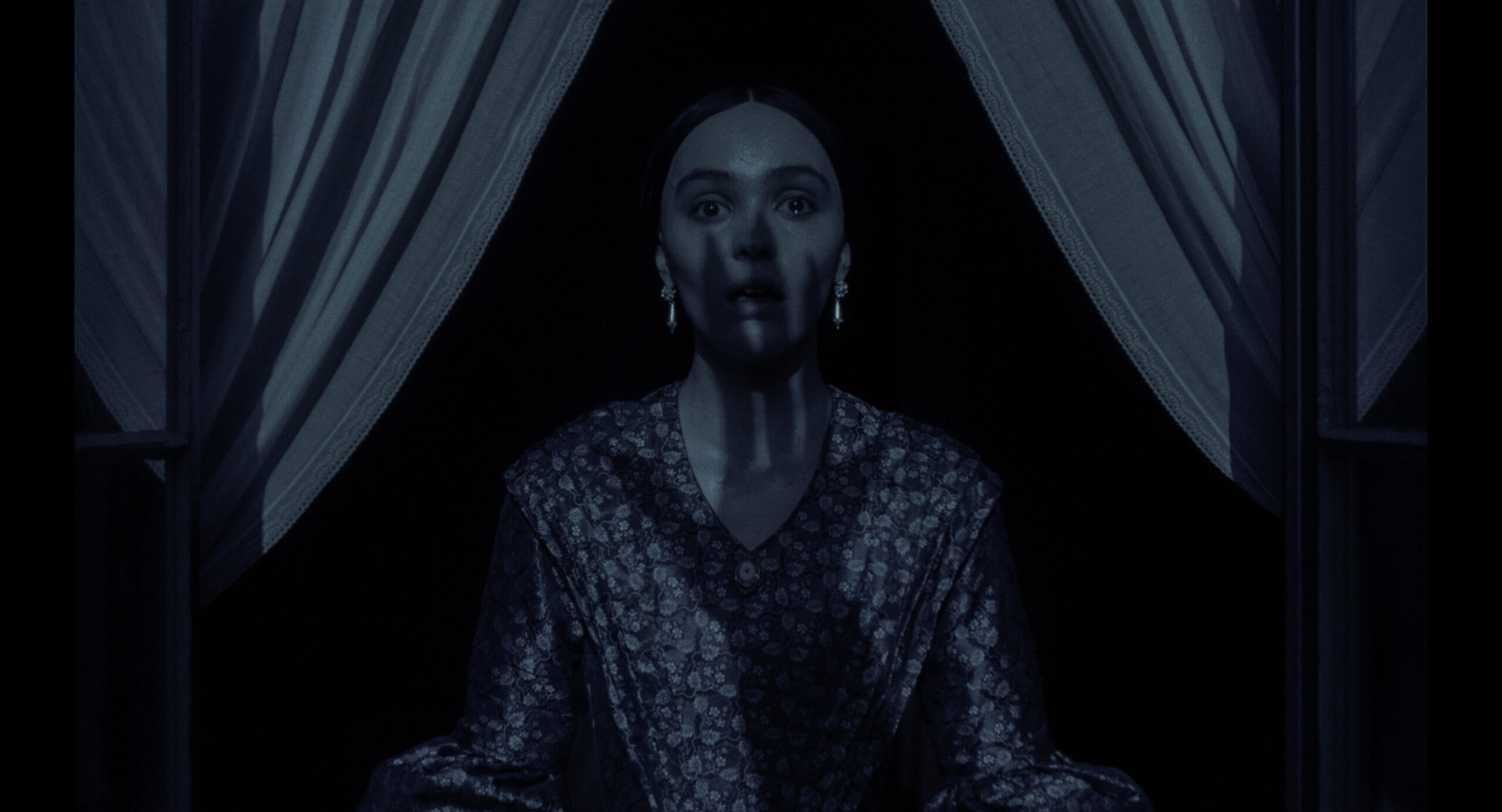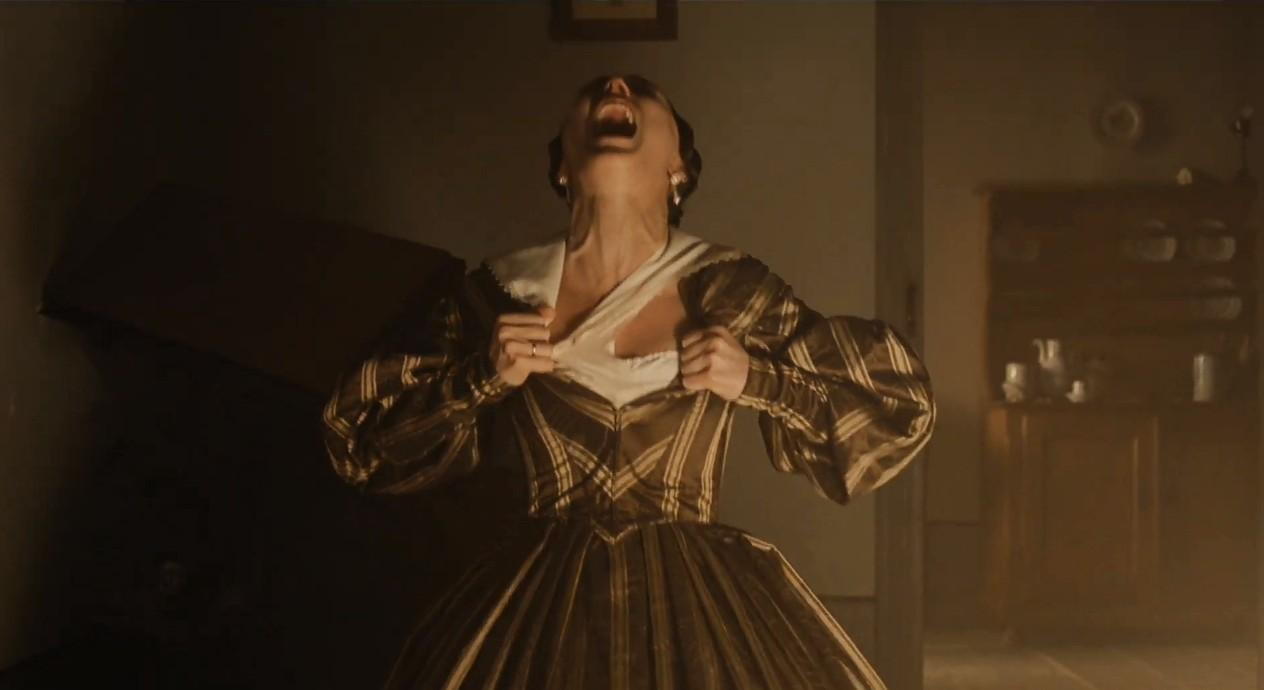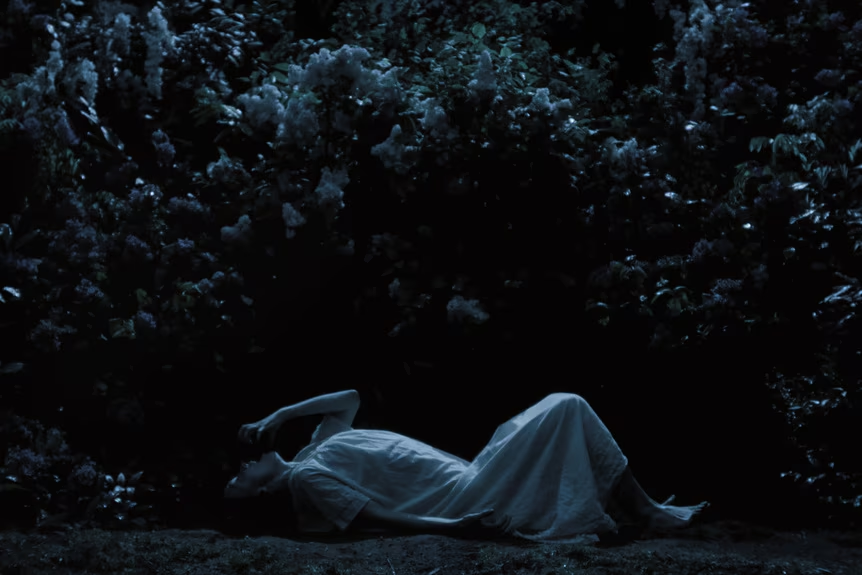Robert Eggers’ ‘Nosferatu’ Rejects Eroticism To Portray A Harrowing Reality

Watching Robert Eggers’ 2024 take on Nosferatu took my breath away. But it wasn’t due to striking visuals or stunning performances. It wasn’t due to the terror Count Orlok struck in my heart. No, it was due to how Eggers created a vampire film that directly confronts sexual assault and the horrors of trying to escape a lifelong abuser. As the credits began to roll and lights in the theater came on, I sat stunned, unable to process what had just unfolded on screen. My husband gently touched my hand and asked if I was OK. Tears rolled down my cheeks as I nodded, unable to articulate how Eggers’ vampire reminded me of my own abuser and what it meant to try and escape his oppressive influence.
Decades of vampire films and TV shows have portrayed bloodsuckers as seductive, sexual creatures ready to fulfill your every fantasy—especially Francis Ford Coppola’s deeply erotic Bram Stoker’s Dracula and the persistently horny HBO series True Blood. So, there’s an inherent expectation that any entry in the subgenre will be horny to some degree. I myself have written countless words about how hot Bram Stoker’s Dracula is and how it persists as a strangely romantic horror story.
However, these narratives always carry an uncomfortable subtext as vampires often manipulate mortals to get what they want, whether that be blood, sex, or both. Is Mina really consenting to Dracula in Bram Stoker’s Dracula or is she just under his thrall? Does True Blood’s Sookie really love Bill? These are questions we could argue about until we’re blue in the face, but one thing is for certain: navigating consent within vampire narratives is trick.

But in Nosferatu (2024), Eggers directly confronts the topic by removing the typical eroticism expected of the genre to craft a truly terrifying creature (Bill Skarsgård) with an appetite only satisfied by devouring Ellen’s (Lily-Rose Depp) mind, body, and soul. This is not romance; this is violent male obsession with owning the female body through any means necessary.
In the original Nosferatu, directed by F.W. Murnau and released in 1922, Ellen is the object of Count Orlok’s obsession, but solely based on his glimpse of a photograph. While still undoubtedly creepy as a man covets a woman based on a single image, Ellen’s story is ultimately surface level, one defined by her relationship with men and how they perceive her. She is not characterized much beyond being a wife and an object of desire. She is a body to be consumed, a tragic feminine hero meant to represent the perfect, pure-hearted woman willing to die to save the day.
In Nosferatu (2024), Eggers expands Ellen’s story (to the point that I wish the film was solely about her rather than the aimless men bumbling around Wisbourg) into a narrative about a woman fighting back against a stalker and abuser, trying to retain any modicum of her humanity and agency in a world that wants to cage her. He creates a more complex relationship between Ellen and Orlok, one that extends well past an photograph. This vampire isn’t just coveting Ellen due to a beautiful photo; he’s been lusting after her since she was a child.
As a young, lonely girl with psychically sensitive powers and a recently deceased mother, Ellen reached into the void, looking for company anywhere she could find it. From the dark, Orlok answered, taking advantage of her naivety and deep sadness and coveting her inherent “specialness”, which is painfully reminiscent of typical grooming behavior exhibited by adults attracted to minors. His manipulation culminates in his sexual assault of young Ellen, which results in her father discovering her naked and convulsing in the garden. But of course, Ellen was blamed and labelled unruly, another woman ignored because she acts outside of patriarchal bounds.

Since that day, Ellen has dealt with nightmares, seizures, bouts of depression, and screaming fits, only further proving to the men around her that she’s crazy, rather than tormented. She can’t tell anyone the truth because they would just further claim she was insane. No one believes her and she must make sense of her experiences alone. These horrific physical reactions—which only worsen as Orlok approaches Wisbourg—can be seen as episodes brought on by post-traumatic stress disorder (PTSD). She loses control of her body not due to ecstasy, but due to her panic about his impending approach, a cursed return that only promises more pain.
But on top of her fits, Ellen is also plagued by Orlok’s voice in her head and in her nightmares, never letting her have a single second of peace. His vampiric influence from thousands of miles away is reminiscent of my own abuser’s relentless attempts to gaslight me into staying. Streams of text messages after our break-up claimed that I could never stay away, that we were meant to be together, that he never believed I had the courage to truly end our relationship. I was mandated to call him every day at a certain time or I’d be berated for being selfish.
No matter where I went, he could find me, whether that meant showing up unexpectedly at my college or calling me until I’d pick up. His words made me want to tear at my clothes, my hair, and my skin. They made me want to scream in rage as I couldn’t quite figure out why I didn’t just block his number and move on. No matter how much he made me cry, I stayed and listened; it felt safer than fully leaving. He wore me down to a shell of a human being. It was all I knew, just as Orlok’s voice is all Ellen knew.

Perhaps one of the most harrowing scenes of Nosferatu (2024) doesn’t involve blood or rats. It’s a sex scene between Ellen and her husband Thomas (Nicholas Hoult) after she smashes porcelain and screams in his face. She’s angry and confused and doesn’t know what else to do to keep the man who loves her safe. Despite her rage, he embraces her and they start having sex, a desperate attempt at intimacy in the face of tragedy. Then, mid-coitus, she screams, “Let us show him our love” to show herself, her husband, and her abuser that she loves Thomas, not Orlok.
Sexual intimacy after abuse is terrifying but can also be incredibly empowering, a way to reclaim your bodily autonomy and sexuality in the face of trauma. In this sequence, Ellen is trying to do just that: reclaim her sexuality and spit in the face of Orlok, who claims her husband could never satisfy her.
Orlok’s very words again echo those of my abuser, who told me that my new boyfriend (now husband) could never treat me like he did and could never satisfy me like he did. He tried to appeal to my more base desires to lure me back in, a nasty tactic and a last-ditch effort to get me back. So from my perspective, nothing about this sex scene is erotic. Rather, it’s a tragic and heart-wrenching example of Ellen clawing for normalcy after a lifetime of being plagued by her stalker’s voice swirling around in her head. It’s her desperate declaration that she is a sexual being in spite of Orlok, not because of him.

But no matter her attempts, Orlok will never go away. Like the abusive ex who blackmails you and destroys all of your friendships when you speak out publicly against his behavior, Orlok doesn’t take well to a challenge. When Ellen refuses him, he unleashes hell upon her loved ones and her community, ravaging the town with plague and consuming the only friend Ellen has. It’s an act of alienation, of removing everything she loves and cares about to the point that she has no other choice but to become his. He’s no longer tearing at her subconscious—instead, he is tearing at her reality, expanding the scope of his abuse to get what he wants. It’s only when she gives in that the madness stops.
Here is where this horrifying interpretation of the Gothic vampire takes an even more upsetting turn. Ellen’s destiny is to ultimately sacrifice herself to destroy Orlok before he destroys all of humanity. Even though he’s preyed on her since she was a child and targeted her sexually, emotionally, and mentally, she must still die at his hand. Further, she must die while subjecting herself to one last sexual encounter with the creature that’s essentially groomed and tortured her for decades. No one can save her, which loudly speaks to the isolation survivors feel as they search just for support in the wake of their experiences.
No matter her attempts to move on and no matter the love she finds from a husband, Orlok will always find her and ensure her torment. While she is choosing to go out on her own terms and end her abuser’s reign, it raises questions about what it means to try and escape from an abuser’s thrall and if it’s even possible.
While the Ellen of Nosferatu (1922) does sacrifice herself to stop Orlok, he solely drinks her blood (which can be interpreted as a metaphor for rape). But, there is no explicit eroticism or sexualization of Ellen’s body. Her sacrifice, while noble, is nothing more than a way to end a film. Now, in Nosferatu (2024), Eggers makes Ellen’s death a true tragedy as the only way she can escape her mental anguish is to die at the hand of the very man who’s terrorized her every waking and sleeping moment simply because she was a lonely child.
By creating a sexually voracious vampire with essentially an obsessive crush on a little girl, Eggers explicitly makes this telling of Nosferatu a nauseating yet crucial look at the exploitation of the female body. There is no romance inherent to Ellen’s relationship with Orlok; instead, it is a relationship built on and shaped by fear, manipulation, and toxic obsession. It’s a daring avenue to pursue, especially in a period piece based on a century-old film, but it ultimately brings this narrative into 2024.
This explicit choice answers any questions about why adapt Nosferatu now. Now more than ever we need to be confronted about the rotting realities that we once viewed with rose-colored glasses. Now is the time to rip at the skin of our abusers and expose them for the monsters they are. We must fight back and refuse to let any more women become sacrifices at the alter of patriarchy, whether they offer themselves up or not. The time for female sacrifice is over. Now, it’s time for female rage, fury, and revenge.
Categorized: Editorials
